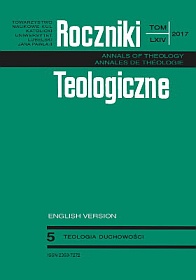Reality of a Sin and how to Overcome it
Abstract
In theology, a sin is described as mysterium iniquitatis and absolution from it— mysterium salutis or pietatis. In the New Testament a sin is always connected with absolution, “forgiveness,” and sinners are of great concern for Jesus. Nevertheless, modern culture becomes more and more detached from Christian tradition and thus deprives a human being of the spiritual values and makes him become further impoverished. This article provides a synthetic discussion of the reality of a sin—“mystery of illicitness” and also reflects on repentance and reconciliation with God and with one’s own neighbour.
The reflections presented in this article are based on the teachings of the contemporary Church and on the Papal teachings especially.
References
Second Vatican Council, Gaudium et Spes (1965). “Pastoral constitution on the Church in the Modern World Gaudium et Spes Promulgated by His Holiness, Pope Paul VI on December 7, 1965.” The Holy See. Archive. Ecumenical Councils. Second Vatican Council. Accessed 15 June 2018. http://www.vatican.va/archive/hist_councils/ii_vatican_council/documents/vat-ii_const_19651207_gaudium-et-spes_en.html.
“Catechism of the Catholic Church.” The Holy See. Archive. Accessed 15 June 2018. http://www.vatican.va/archive/eng0015/_index.htm.
John Paul II, Redemptor Hominis (1979). “John Paul II, Supreme Pontiff, Encyclical Letter Redemptor Hominis […].” The Holy See. John Paul II. Encyclicals. Accessed 15 June 2018. http://w2.vatican.va/content/john-paul-ii/en/encyclicals/documents/hf_jp-ii_enc_04031979_redemptor-hominis.html
John Paul II, Reconciliatio et Paenitentia (1984). “Post-Synodal Apostolic Exhortation Reconciliation and Penance of John Paul II […].” The Holy See. John Paul II. Apostolic Exhortations. Accessed 15 June 2018. http://w2.vatican.va/content/john-paul-ii/en/apost_exhortations/documents/hf_jp-ii_exh_02121984_reconciliatio-et-paenitentia.html.
St. Ambrose. De Paenitentia. PL 16, 465–524.
St. Augustine. Contra Faustum Manichaeum. PL 42, 207–518.
St. Thomas Aquinas. Summa Theologiae (STh) 2–2, q. 118.
Gubała, Wacław. “Zanik poczucia grzechu.” Homo Dei 1985: 177–82.
Häring, Hermann. Die Macht des Bösen. Das Erbe Augustinus, Zürich, Köln, Gütersloh: Benziger Verlag, Gütersloher Verlagshaus Gerd Mohn, 1979.
Kuczkowski, Stanisław. “Poczucie winy w literaturze psychologicznej.” Collectanea Theologica 44 (1974), no. 1: 67-75.
Kuczkowski, Stanisław. “Geneza patologicznego poczucia winy.” Collectanea Theologica 44 (1974), no. 2: 61-77.
Misiurek, Jerzy. “Wierzę w grzechów odpuszczenie.” In Miłość większa niż grzech. (Homo meditans, XII), edited by Antoni J. Nowak, Walerian Słomka, 45–59. Lublin: Towarzystwo Naukowe KUL, 1996.
Popławski, Jarosław M. “Nawrócenie św. Pawła w kontekście chrześcijańskiej duchowości.” In Spiritualitas. Vol. I: Św. Paweł i jego dzieło, edited by Jarosław M. Popławski, 65-74. Lublin: Wydawnictwo KUL, 2014.
Copyright (c) 2017 Roczniki Teologiczne

This work is licensed under a Creative Commons Attribution-NonCommercial-NoDerivatives 4.0 International License.





